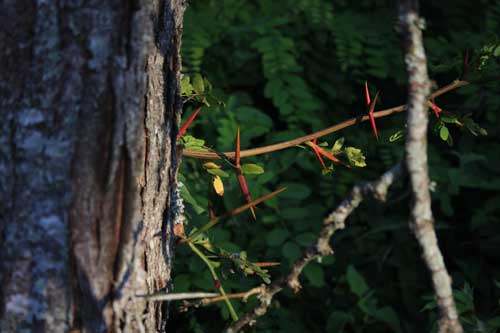|
VISIT OUR MASSES and HOMILIES ONLINE! CLICK BELOW TO WATCH
St. Elizabeth of Ravenna Catholic Church

Bee on flower of St. John's wort.
(*photo by Sally Ramsdell)
September 1, 2021 Solving Honey Bee Colony Collapse Disorder
At the start of this century we asked, “Where have all the honey bees gone?” And we asked with urgency since these working creatures are major pollinators for fruit and other crops. The phenomenon became known as Colony Collapse Disorder (CCD), and the problem could spread and become severe. It was soon noted in many places that entire colonies of worker bees simply disappeared. Perhaps the 2012 article in the Bulletin of Insectology by Chensheng Lu, et al. entitled "In situ Replication of Honey Bee Colony Collapse Disorder" helped unravel the puzzle. We noted in our reflections several years ago that discovering the problem is the first of a three-phase treatment of an environmental disaster: discovering the problem; determining the causes of the problem; and discussing and implementing solutions.
Harvard School of Public Health scientists moved the problem to the second stage. While a number of other causes have been proposed, Lu and associates focused on the role of Imidacloprid, one of the neonicotinoid insecticides used in crop protection. They asked why CCD became so ubiquitous? The approach was to look at the alternative to the sucrose-supplied bee colonies; sugar is traditionally added to help supply energy to bees during colder periods. The scientists looked at alternative high fructose corn syrup (HFCS) that contained traces of Imidacloprid, originally inserted in the genetically-engineered seed corn, from which yielded corn product was processed into HFCS.
The hypothesis that this was the culprit led to constructing Imidacloprid-treated hives with parallel control (untreated) hives. In time, the treated hives were 94% destroyed. "Data from this in situ study provide convincing evidence that exposure to sub-lethal levels of Imidacloprid in HFCS causes honey bees to exhibit symptoms consistent to CCD, 23 weeks after Imidacloprid dosing." Evidence in these and other studies show that chemicals in the environment are the most likely culprits of this shocking CCD epidemic. The third stage should be quite simple, if this is proven to be the major cause, namely, return to traditional sugar feed for bees. This proves to be a major relief for growers who have worried that there would not be sufficient bees to pollinate their large-scale fruit and other crops. However, it doesn't solve the problem of the use of other toxic chemicals in agriculture.
Unfortunately, last year France which had a total ban on the neonic class of pesticides yielded to pressure from Bayer and other agrochemical lobby groups and lifted the ban. This occurred at the time a major effort has been underway to curb this class (neonics) in environmental conscious nations. The bees may be like canaries in a mine; their tragic end is a lesson, and their welfare must be maintained by curbing used of harmful chemicals in agriculture. As a chemist I say, "All chemicals deserve respect."
Prayer: Lord, keep us alert to the dangers that constantly crop up, and inspire us to protect our needed crop pollinators.

Wildflowers of September
Black-eyed Susan.
(*photo
credit)
September 2, 2021 Evaluating Creation-Centered Spiritualities
Environmental awareness leads to a variety of eco-spiritualities, some more effective and inspiring than others. We must remember that "spirituality" is a neutral term, not an inherently good one -- for there are bad spirits -- and bad spiritualities; the Nazis had theirs and demanded adherence from many, including youth, in a diabolic sort of way. Materialists can be inspired with a spirituality in which money is their god; Communists have their own spirituality, even if they deny it.
Discernment of spirits acknowledges the titanic battle being waged between global good and bad spirits. An authentic eco-spirituality does not deny problems, seek excuses for not being involved, or seek to escape into other allurements. From a secular standpoint, some regard primitive isolated worldviews as ideally loving and caring for "creation," to be preserved and even imitated. However, the world movement to connectedness (discovery, exploration, trade and conquest) yields examples of greed, oppression and even slavery. An ideal Christian perspective accepts the reality of mishaps and tries to redeem and renew a damaged environment (the additional theological components of redemption, and resurrection). This involves addressing dysfunctional causes of mishaps and promoting appropriate technologies to answer existing problems.
"Creation-Centered Spiritualities" (CCS) is popular today, but have the flaws of deemphasizing misuse of creation and confronting problems. Some CCS folks even blame those addressing mishaps as causes of the difficulties -- as though if left alone, all would be ideal. However, an authentic eco-spirituality must be based on knowing the true state of local conditions and interactions, and broadly accepting efforts at addressing problems with joint collaborative solutions involved in repairing environmental damage.
CCS people may or may not share a sense of urgency, and may seek to escape to nature; they prefer to isolate themselves, if possible, from the reality of confronting climate change and polluters. Rather, an effective eco-spirituality involves an appropriate technology that is geared to solving existing problems on our wounded Earth. We must do more than announce damage; we must engage in healing operations, expose culprits and take necessary steps to reduce oppressive measures through practical efforts.
An authentic eco-spirituality confronts a consumerist economy as a malfunctioning source of disparity of wealth and wasteful use of resources. CCS ignores the primacy of social change and the inherent addictiveness of our culture. Addicts do not function well in self-improving intellectual exercises; their will power issues must be addressed. CCS often overlook human powerlessness and the need for divine assistance; loving nature demands more.
Prayer: Lord, help us speak frankly about eco-spirituality.
Are We Going to Halt Climate Change?
This month we will review the renewable energy (wind, solar, hydro and geothermal) progress needed to curb climate change. We are aware that carbon dioxide emissions are increasing, methane is being released from melting permafrost, ice sheets are melting, extreme weather events are more frequent, and many are suffering from extreme heat waves. The climate is changing -- though there are still a few deniers. Our efforts are to keep our minds focused on this subject and what we must do, especially during this continuing pandemic -- knowing well that this could have been halted by a non-politicized vaccination program. The individualistic mentality associated with denying the Delta virus is the same mindset that ignores or postpones responsibility needed to curb climate change. A certain amount of social pressure is necessary, and if not present then we might expect catastrophe.
We CAN curb climate change. Next week we will review the renewable energy replacements for the coal, oil and natural gas so prominent in American and world energy application and electricity production. Technically, enough is known and being applied (though not fast enough to successfully substitute all fossil fuel use), but through a stronger political will the proper renewal of our economy is possible. Where there is a will, there is a way.
We MAY NOT succeed in curbing climate change. The third week will be a consideration of the fact that we have forces (social, economic and political) working against success. In fact, it appears that partisan forces could rejoice if the curbing process fails. This cynical wish to delay or damage the process of substitution of renewables could actually become the monkey wrench of disaster. Add to this, influence of economic forces that still back fossil fuels and the inequality of our economic system; if these go unconfronted we could miss the mark later in this century, resulting in one or so degrees of temperature rise above current levels. Such could be catastrophic.
We MUST curb climate change. This is a moral issue, for otherwise a major portion of the desperately poor will lose farming and food-producing potential and must abandon lodging inundated by rising ocean levels. In the last week of September, we will look at the moral imperative and what this may entail on the part of global collaboration and national changes in renewal economics. We certainly must make changes in order that the curbing program proceed with deliberate speed. Moral issues are harder to discuss and policies stemming from them harder to enforce in a secular nation like ours. We simply cannot become isolationist and leave the actions to other nations; we must take part and that is truly a challenge.
Our work looms before us: Will we succeed in curbing climate change? It is our hope and it demands our earnest collaboration with Earth's people of good will. It will take concerted effort and with God's grace we can succeed.

A single stem of lady's tresses (Spiranthes lacera)
in Washington Co., KY.
(*photo
credit)
September 3, 2021 Honoring Tony Mazzocchi, Labor Warrior
This Labor Day weekend is proper for reflecting on and highlighting the rare champions of worker health and safety. One such labor leader was Tony Mazzocchi (1926-2002), whose roots were in New York and who went on to be the Legislative Director and then Vice President of the Oil, Chemical, and Atomic Workers Union (now part of the United Steelworkers). Later in 2012 the Labor Department honored Tony for his tireless commitment to the safety, health and welfare of America's workers; Tony's extraordinary efforts and leadership won him a place in the Labor Department's honored Hall of Honor.
Among the contributions cited was Tony's recognition that scientists and rank-and-file workers shared the same goal of reducing workplace chemical exposures, and that both groups could learn from each other. Tony was one of the first to note the health and safety issues that workers faced in chemical processing. The citation noted that Tony involved physicians and public health scientists in researching the health effects of workplace chemicals, and in sharing their results with workers. He also enlisted workers to teach medical and other students about how change occurs on the shop floor.
Tony was tireless, and over several decades of work he influenced countless people and as David Michael, assistant secretary of Labor, said in the citation, "Tony's legacy lives on today in worker health groups across our nation, in which workers, unions, activists, and professionals come together to prevent work- place hazards."
History is soon forgotten, but Tony's work ought to remain, for every worker in a chemical processing organization owes him gratitude. Tony was ever watchful for public service opportunities; he targeted the labor-concerned members of Congress and, with fire in his eyes and urgency in his voice, he was immensely persuasive. He played a major role in convincing Congress to pass the seminal Occupational Safety and Health Act (OSHA) of 1970, legislation that is still important today.
The year 1970 was also the formal beginning of the environmental movement; this was also the year Tony encouraged three of us budding public interest scientists (Mike Jacobson, Jim Sullivan and me) to begin the Center for Science in the Public Interest. He offered his library in the Union headquarters in Washington, DC as our first office which we shared with notable scientist and nuclear safety advocate, John Gofman (1918-2007). Mike and Jim alerted me to Tony's award, and we recalled that without Tony's help the three of us would have had a very hard time getting started. Tony linked word with deed as was his habit.
Prayer: Lord, raise up other public-spirited people from the ranks of labor to help improve the quality of the workplace for all fellow workers.

Lushness of late summer into early autumn.
(*photo
credit)
September 4, 2021 Creating Jobs through Environmental Protection
The job losses due to the pandemic have been severe in a number of areas: sales, middle management, office construction, travel services, and higher education. However, with a shift in emphasis more jobs are awaiting filling for environmental work. Converting some of the military expenditures to infrastructure improvement is quite proper. As we stress many times, addressing those who suffer from food, water and housing insecurity is more bang for the buck that a trillion dollars plus each year for military expenditure. In fact, "security" needs redefining.
Renewable energy implementation is creating a quarter of a million job opportunities, that include both R&D and also installing and maintaining solar and wind applications and extending utility transmission systems. Improvement costs are investments in the needed infrastructure and can be repaid through fees that will actually reduce continuation of environmentally costly coal-fired and nuclear powerplants. Wind and solar costs are plummeting and these applications are now competitive and falling below fossil fuel sources, even natural gas ones.
Recycling programs require workers to collect, sort, ship, and reprocess the materials collected. While these are not high-paying jobs, they are needed on a full-time basis, and the reprocessed recycled materials pay decent salaries.
Environmental reclamation programs are needed in many resource-extracting parts of our nation. These remedial activities could be partly paid for by fees and fines on culprits and by charges to those who use resources extracted and lands reclaimed.
Infrastructure for transportation includes hiking and bike trail networks (some Rails-to-Trails), but also investment in revitalized public transportation systems requiring construction and maintenance personnel at various skilled levels.
Home efficiency programs could be expanded to include domestic construction and retrofitting programs. The massive energy savings would be the basis for funding the additional jobs. Here is where the domestic focus of the pandemic triggers long-term investment.
Caring for shut-ins and elderly is a form of domestic environmental protection. Most often, this demands stay-at-home caregivers who replace expensive institutional care facilities and personnel. Funding home caregivers costs far less, protects the quality of life for elders, and keeps money in local settings.
Establishing proper recreational facilities in natural areas could enlist talents of those who seek fulfilling and high-quality service jobs: office, lodging and food personnel, builders, guides, park police, and grounds managers. User fees can recoup costs.
Prayer: Lord, inspire us to find work in environmental areas.

Tony, a very curious kitty.
(*photo
credit)
September 5, 2021 Attending Those with Hearing Impediments
He does all things well; he makes the deaf hear
and the dumb speak. (Mark 7:37)
Those of us with hearing loss bear a cross as do those who have to communicate with us -- though it is not as severe as loss of sight. We, who struggle to hear, thank God that it is not overly burdensome and that silence can be golden. Without straining and attempting to read lips, I miss important aspects of conversation on many occasions, for much depends on the depth of voice of speakers and the high pitches of young and female speakers. And I have unsuccessfully tried 3 sets of hearing aids.
Jesus has compassion for the deaf person with the speaking impediment. He takes him aside and undertakes certain actions to get him to be healed. This compassion leading to action is really a foreshadowing of what researchers and healers should do as well. The ability to have more than pity, and to actually translate a passive suffering with another (compassion) into active service, is the continuation of the work Jesus initiated 2000 years. Improved audio technology is occurring as Jesus laid the groundwork.
Miracles happen within the realm of human compassion and a caring atmosphere. Authentic miracles are meant to elicit faith on the part of the recipient and witnesses. Few believers dwell on the fact that healing and teaching go together, and Jesus as healer/teacher is performing more than healing. In practical ways Jesus teaches all of us to devote time and resources to the healing ministry. We create an atmosphere in which general healing occurs: hospitals and clinics, silent bedroom space, medicine and operations, research and fashioning of hearing devices, and orthopedic treatments. Our goals today should be similar to the compassionate goal of Jesus, namely, to give care to those who suffer and to teach all, whether victim or general public, that caregiving takes effort and resources -- and is needed to improve the world in which we live. We do not tell sufferers "good luck, and endure with patience." We help them in concrete ways.
The Eucharist gives us the nourishment to be like Jesus and to be of one mind and heart with him. We are the body of Christ, and that means at one with his loving heart. Not all of us can offer personal care for others, nor are we expected to when lacking talent in such ministry. But we can enter into the heart of the miracle-making process when we pray for researchers and caregivers and for all the uninsured. Health care needs to be universal in a world of abundant resources, and furnishing them is the best form of national and global security. Through the effort of a democratic people, we can theoretically provide for the health needs of all people. The Eucharist helps us effect changes that make the possible a reality. We must believe it is possible.
Prayer: Lord, empower us to see that miracles happen through the efforts of believers working together for the good of all.

Find the spider... White phase of the crab
spider, family Thomisidae
(far right, clinging to blossom).
(*photo
credit)
September 6, 2021 Affirming the American Dream by a Living Wage
On this Labor Day, we return to the negligence of our American society to the right of each citizen to work and use their own God-given talents in their short life -- truly a hopeful dream. Add to this the right to a living wage. Actually, that wage may vary with the number of dependents, the place where residing and the added health conditions of the worker. Now compound this with the waste and luxury of our culture; unfortunately, what some people regard as needs are simply their unnecessary wants, and that internal pressure on the part of wage-earners from peers broadens their definition of the "living wage."
I know people who are almost too ashamed to say that their wages are not enough to meet their elementary needs: proper housing, current utility bills, and basic nutritious food for their children. Many people on this planet also suffer from such lack of adequate wages -- if they are lucky enough to be wage-earners. So often in the past, my response was that they ought not depend on wages but be self-employed or engage in small-time agriculture or crafts. However, as much more of the world becomes urbanized and removed from land and small towns, people depend on wages for elementary human needs. We may dislike current trends, but we cannot turn back the human exodus to cities and metropolitan areas; we must address this phenomenon forthrightly.
The great difficulty in this discussion is seeing things from the viewpoint of the wage-generator, who must earn enough to keep the organization paying wages afloat; managers must thrive to continue employing workers and give them their just income. To distribute too little wages is unjust, too much could lead to corporate bankruptcy. The tightrope walker who masters Niagara Falls requires extreme balancing; so do many business managers every week and month. Separating wage-giver and receiver creates the on-going problem of balance. Why not abolish the distinction between giver and receiver and make the workplace owned by the wage-earner, and thus all share equally in wage concerns?
People press us who are critical of the current system: what is a better replacement? The answer is that with time the worker ought to earn the place of work, and thus become both employer and employee. Then the living wage becomes a concern and duty of the entire group of workers. Certainly this is a hard saying for distant owners or investors, but quite telling for the vitality of a community where the work is benefit to all present. Otherwise, the unhealthy state of affairs exists where non-workers become the privileged class and expect preferential treatment. Should not those who work be privileged? Yes, it is a privilege to be able to work and earn a living, and a double privilege to own in part the place and means of employment.
Prayer: Lord, teach us to be just with all, to help workers to make a living, and to expand the system so their quality of life may improve through the fruit of their labors.

Begonias, nature's perfect work of art.
(*photo by
Sally Ramsdell)
September 7, 2021 Encouraging the Grandma Moses in Elders
On this 161st birthday of Grandma Moses (1860-1961)) we celebrate a person who became a popular artist and personage after her eightieth year. Several other "late bloomers" have cropped up in history: political leaders, writers, business people, and popes. Recall that philosophers put Immanuel Kant in this category. The point here is not that such phenomena occur, but that we do not recognize the special gifts of elders who continue to make progress in some fields long after normal retirement years.
The primary gift of elders is wisdom acquired through long years of hard knocks and success or its lack. I heard an interview once with Noam Chomsky, a radical thinker, who has been critical of the political and economic system of our age and our country. He shows in his measured responses willingness to allow things to evolve, and accepts that they would eventually be solved long past his limited mortal span. Yes, wisdom includes knowledge of the shortness and other limits of this mortal life. The dreams of youth and accomplishments have to be modified, and we have to learn to live with reality and a limited legacy.
Elders like to complain or "belly ache" that others do not listen to them -- but did they ever? Few seem to be listening today, for everybody is speaking at the same time. It's not so much hearing difficulties, but competing noise from many sources. Certainly, this website is an attempt to speak by the elderly, but so are a host of others. Here many elders have the disadvantage because they have failed to master the foibles of the Internet -- and are silent even when expected to speak.
First suggestion: Encourage elders to do their own thing. Too often people feel self-conscious, especially while watching the talents shown on TV shows or in the various events we are privileged to attend. Talents are cheered, but all have some.
Second suggestion: Encourage elders to launch their own enterprises. The difference from the first hint is that here people are asked to break silence and routine, and pursue a new pursuit. Such "elder-launchings" keep minds agile and able to find new pathways to use what is already there, and to take on a freshness that will inspire others to follow suit.
Third suggestion: Extend encouragement to people of all ages. Encouragement is not limited to a single age group. Many elders show their humility and feel far less talented than others; they give an excuse for not engaging in a new practice such as dancing, singing, exercising, and caregiving for those in need. Yes, it is for their own growth in self-worth to develop a new skill, and it is beneficial for those they serve as well.
Prayer: Thank you, Lord, for allowing me to take up church chanting in late life, and enjoy it -- though listeners may differ in their levels of enjoyment. Help elders to new pursuits.

(*photo by Robert Dueweke, OSA, www.dueweke.net)
September 8, 2021 Breaking Up Banks Too Big to Fail
Where is it written in concrete that we guarantee large banks, because their failure will do massive economic harm? Isn't it a strange view that economic well-being is guaranteed, no matter how careless the company? If you are big enough can you do anything, just because you are big enough? How is it possible that a Federal Administration simply couples with legislators to keep alive banks that have no right to continued existence?
Jamie Dimon, the CEO of JP Morgan Chase, apologizes for an egregious loss of at least six billion dollars in 2012 -- only two years before he had been regarded as the paragon of banking success. Yes, failure hangs over the financial world, but how flawed is the legislators’ guarantee that those who are big enough are not to be allowed to fail? Yes, the possibility is there: failure rests in the uncontrollable size of current big banks.
What are advantages of focusing on smaller banks? Local and regional banks attend to the needs of the people and reflect those needs through business activity; compensation to executives is not massive but geared to low compensation schedules; influence is more local in targeting? Clientele can judge the activities of a local bank more easily; and local banks will know and support deserving local projects rather than those at a distance. Small bankers point out the unfair advantage of the giants, who will expect a taxpayer bailout if their risks go bad. For the smaller ones in the community of banking, such risks are not allowed. Still, recall that small banks have the same bureaucratic burden as larger ones, but without guarantee of support if too careless in their business.
If small banks have so many advantages and large ones tend to be more risk-prone, why tolerate the big ones in our society? Place taxes on the big ones and make these either businesslike or allowed to go bankrupt. Better still, break them up to smaller ones. Banking should be a public matter, not a private gambling bout. The call is for cooperative endeavors at all levels -- and banking is a public's business, whether at the local or national or global levels. Privateers and pirates are out of fashion, and so are hedge-fund operators and cushy, high-salaried bank executives. Let's get rid of big banks, for smaller ones can serve us and the community better by knowing local needs. Let's get rid of the ones that have failed and call for bail-outs. Where possible, let's return banking to local or regional levels.
The shock of the Great Recession of thirteen years ago and the recent pandemic still resonates. Is this situation out of control when the large banks now incorporate over half of America's GDP? Bigness at a private level goes against our very system of democracy, for it allows a few unelected people to decide the fate of a nation and world. Big banks are uncontrollable.
Prayer: Lord, buck up our courage and especially those of our legislators; help our country control finances at all levels.

Wild grapes in hand, a tasty treat.
(*photo credit)
September 9, 2021 Choosing Grapes as a Fruit of the Season
Then the trees say to the vines, "Come now you be our king!"
(Judges 9:12)
Note that we do not say that grapes are "THE fruit of the season," for we know that in various places a rich variety of produce from orchards, vegetable gardens, and berry patches are super-abundant throughout summer and into autumn. However, grapes are a notable fruit; viniculture and general culture go hand-in-hand. Grapes are fruit of the vine and a source of wine, and thus hold widespread human attention. Grape-gathering straddles summer and fall, and gives different levels of wine tastes and quality depending on soil conditions, amount of sunlight, moisture, and temperature variation during the day -- and even still more specific characteristics that experts can list.
Grape quality varies from year to year. Some of us noticed a new phenomenon each year, namely, having early mid-winter warm spells as well as early and mid-spring frosts and cold conditions. Fortunately, the vines can generally withstand these variations and still return next year, but amounts of produce will respond to these variations and occasionally we have no grapes at all.
Grapes are rich in symbolism; their clusters were carved in the facade of the Jerusalem Temple -- akin to maple leaves in Canada. Grapes and their products represent fertility, plentitude, joy, wealth, distinction, allurement to misuse, wrath, celebration, and prosperity. Where they grow abundantly in fertile soil, they are a sign of promise; when as fruit of the vine, they are pleasurable and when misused by excessive drink, detrimental. Grapes need the vine-dresser's loving care. (In my youth we always manured grapes, trimmed them twice a year, and kept them weed-free.) Jesus confirms this need for care in several parables and speaks of the twice-trimmed vines (John 10): in the winter the vine-dresser removes dead wood and again in middle summer removes the excessive shoots, so the vines can concentrate efforts on grape production.
Grapes are enjoyable to our taste buds. Wild grapes are quite tasty in themselves, at least some of the varieties found in our woods; in early to later autumn, hikers find them a welcome treat. The joy extends to raw table grapes that often meet the fruit lovers' tastes. Furthermore, Concord grapes make wonderful grape juice, along with grape jelly and even grape cobblers, one of my favorites. Besides wine, the distinct flavor of grapes can be used in a variety of candies, soft drinks, vinegars, and baking recipes. Along with the health benefits of red wine that has been known for centuries, that of unfermented grape juice is a modern convenience.
Prayer: Lord, you give us all good things, and some fruit rank high on the list of goodness. Help us to use all things properly and to use our grapes with respect and care.
Are Renewables Substituting Rapidly Enough?
We CAN curb climate change. When talking about climate change, one thing is emerging: we can transfer to a renewable energy economy in a short time if we have the will to do so. However, we must counter the rapid increase in global energy use even if Western Europe and North America adopt increased energy efficiency, electric cars, and a rapid rise in wind and solar applications. America is responding with 92% of new U.S. electrical generating capacity in the first half of 2021 being renewables. Total American renewable energy production would be even more than the one-eight of total (11.78% in 2020 and 12.83% this year) if renewable hydropower would not be taking a hit due to drought conditions in the West.
Technically, enough is known to make renewables work even considering future innovative renewable applications, especially in tidal energy and clean hydrogen use arenas. In the first two decades of this century, we have observed a rapid decline in the cost of renewables wind and solar. Solar PV applications went in peak watt from $1.96 in 2010 to $0.42 in 2019, to $0.38 in 2020 and still declining. The wind declines are not as dramatic, but both these renewable energy sources are now competitive or lower priced than installing new fossil fuels or nuclear fuels (3 nuclear plants are being retired this year). Note that most of coal substitution has involved transferring to fracked natural gas, a fossil fuel.
Are changes coming fast enough to curb rapid rise in carbon dioxide levels, along with extreme weather conditions and rapid melting of the Greenland Ice Sheet and glaciers? Higher summer temperatures mean higher global energy use in air conditioning. In fact, total global energy use is on a rapid increase. While carbon dioxide (greenhouse gas) declined by pandemic-driven 2020 reductions, these emissions have bounced back this year to nearly 2019 levels. Percentagewise, renewables are making gains, but total fossil fuel use has remained fairly steady due to increased energy demands, which renewables have not been able to fully address.
The potential for curbing energy use and transferring to renewables is present, but the foremost question at the international climate change meeting coming up in the late autumn is: how widespread is the political will for global change and renewal? Investments in renewable energy sources are certainly increasing: in the first half of 2021, $174 billion were invested in U.S. renewable energy sources, the largest half-year investments ever made -- a rosy picture for the greens. However, renewable wind (both on- and off-shore) and solar (both large farms and individual domestic roof) facilities are not yet meeting both new global energy demands as well as substitution of fossil fuel use. Many of the 200 nations involved in the curbing program want wealthier ones to furnish finances needed for change. The technology is ready; however, there must be willingness to usher in a renewable energy economy. Pray that it's forthcoming.

A lone deptford pink (Dianthus armenia)
(*photo
credit)
September 10, 2021 Expanding the Web of Life on Swap Ideas Day
How can we celebrate Sway Ideas Day when we are in the middle of a pandemic and its aftereffects; most current ideas deal with health safety and proper social interaction for business, education and domestic needs? How can we improve the quality of our life at this critical time? Here are some basic thoughts:
Humor. Can we inject humor into a very serious social interaction even while at a distance? Most of the quips we express have a bite and, when folks are serious, the hurt can lead to breaking a community spirit. It is always a challenge to make people cry and laugh all within a short time period. One path may involve elevating the ideas exchange this year beyond hints for hanging pictures, or placing post-it notes to keep humor alive. Refraining from jokes with a racial overtone may be a first step. Omitting those that disparage others is just as important.
Non-partisanship. Though the matter is delicate, we could attempt to broaden the arena of issues for right-to-lifers who concentrate on abortion and so-called "mercy killing" to include the entire web of life, namely, death penalty, peace issues and climate change. Amazingly, if polarized sides would come together, they would ease the partisanship that is so divisive in America at this time. To acknowledge climate change dangers as well as abortion practices takes the issue either beyond the global to the local, or beyond the local to the regional. To remove the rancor advances non-partisanship, but it leads to the more debatable question as to whether "independents" are better in advancing democratic process than membership in one or other party.
Redistribution. When only a few hold vast sums and believe they have the power to influence elections, our democratic process is in jeopardy. How can a revolution occur that will redistribute the wealth to satisfy the need for essential services (health, education, lodging, etc.)? How do we keep change from becoming violent? How do we hasten the process through non-violent means? Limits on salaries of CEOs have occurred in Europe; can they be initiated in this country as well, perhaps through legislative action and citizen pressure?
Civility. America has a clouded history of lack of civility, even though George Washington spoke openly for the virtue. Recall that in July, 1804 a Vice-President while in office, killed the former Secretary of the Treasury, Alexander Hamilton; it was a duel in which the latter did not even aim his gun. Recall the unsettled issue of slavery festered, so much that one American legislator caned another almost to death within the Capitol. Civility took a back seat during the Civil War, which counted over 700,000 mostly young men killed. The current paralyzed Congress and state legislatures continue the tradition of public incivility.
Prayer: Lord, help us to expand the quality of life for all people, as well as for plants, animals, and Earth herself.

(Photo by Carol Stiefvater, OSF)
September 11, 2021 Recalling Peace Place
Twenty years to the day after the 9-11 attacks on the Twin Towers and the Pentagon, is a perfect time to focus on simpler ways to change a world with little capital and much love and caring.
I believe that one model worth mentioning is a retirement project by some Wisconsin Franciscans (Sisters Carol and Syra), who came to southern Kentucky and started "Peace Place." They started a "farm" from scratch for young abandoned children. Their idea was that animals would act as companions to these children who, in turn, would care for the entire menagerie of chickens, ducks, goats, sheep, pigs, rabbits, and even llamas and a zebra. The children attached themselves to certain animals and also felt close within one big happy family. An alpha llama would perch himself on a tree stump and guard the entire flock with a steady watchful eye.
Like other visitors, I was deeply impressed by the two sisters and their creative ministry that lacked any startup money and any sure means of support -- only the good will of the people who heard about them and were fascinated by their ingenuity and love. Somehow it was as though St. Francis was very close to their enterprise, and was guiding them in making progress. In this busy world some with no funds are able to establish islands of peace that can go out in a ripple effect to influence the rest of the world. Elders can detect possible resources and even enlist the good graces of animals and plants as associates in caregiving.
With time, the passing of Sister Syra demanded that the ministry be turned over to younger hands. But the lasting effect of Peace Place's establishment impressed local residents, visitors, volunteers, and especially youth; Peace Place provided a temporary residence in a region of America lacking in social networks. Sister Carol wrote an essay entitled, "And They All Get Along." Her keen and perceptive insights portray her love and caring -- and how animals enter into establishing new communities. The project had a temporary nature to it due to the selfless contributions of the founding members and their friends. Projects may be temporary and yet highly influential at a given time and place.
A decade ago, Sister Carol returned to Kentucky for a visit; she took time to go to the Louisville Zoo that had accepted a number of her dispersed animal "caregivers." She went to the wide-open area where many mammals are pastured and began singing, "Peace Is Flowing Like a River," and her former zebra perked up its ears and came running over to the fence. Youthful zoo visitors were absolutely amazed that a wild animal would behave in such a fashion. And Sister Carol got a chuckle. Perhaps Sister Syra did as well from up above.
Prayer: Lord, on the challenging anniversary of 9-11, teach us to find new ways to bring peace to our fractured world, and to do so using limited resources at our disposal. Your love can overcome all things, and we need to show it to others.

Trumpet creeper, Campsis radicans
(*photo
credit)
September 12, 2021 Discussing Faith vs. Works with Faith & Works
"You say that you have faith and I have good deeds; I will prove to you that I have faith by showing you my good deeds." (James 2:18)
I was one of the speakers at the funeral of Tommy, who was a murder victim. I pulled from my pocket a listing he had given me of all the Christmas gifts he distributed that winter in America's poorest county (Owsley in Kentucky). After delivering my homily, I rested a brief moment feeling good for enhancing the not-yet-fully-polished diamond of a charitable person gunned down at normal mid-life. Suddenly the other minister sprang to his feet and said in a loud voice, "Tommy was saved by the grace of God." Oh! Here is the battle of Catholic versus Protestant Reformation played out all over again, and I was virtually the only Catholic present. Only by the grace of God, the minister glanced at his watch during a rather long rebuttal of my theological position; the ushers told me afterwards they would have "carried that fellow out for looking at his watch." My failure to glance luckily occurred on that day when snowflakes were heralding the beginning of a major storm.
The above-quoted letter of the apostle James tells us much about the need both to have faith and do good works. Didn't that settle the matter at the beginning of Christianity? Not so! In recent years talks between Catholics and Lutherans came to agreement on the both/and not the either/or; however, the controversy never seems to die because it is so difficult to implement in a balanced manner. We all agree that the gift of faith is from God and that we show our appreciation through deeds. However, the difference is in the weight and effort we place on quickly professing faith in word and living through performing difficult deeds over a lifetime. We must remind ourselves of James' caution about the emptiness of saying, "Goodbye and good luck! Keep warm and well fed."
Interestingly, Earthhealing requires balancing word and deed. The current battle over climate change and whether it is of human causation is a case in point. Essentially, unconcerned consumers say to a troubled world, "Goodbye and Good Luck," as we continue to consume precious resources, the expenditure of which causes the climate change condition. Unfortunately, as more and more of the world wants to be like consuming Americans, pollution caused by misuse of resources grows and the problem becomes ever greater.
We learn the importance of doing difficult deeds through the words of Jesus in today's Gospel passage (Mark 8: 27-35); we must deny our very selves and take up the cross and follow him. Self- denial goes beyond individual practice, and demands that we as a people share with our needy neighbors through public deed. Denial must include addressing excessive consumption and addictive practices of our culture. We need and trust in God's help.
Prayer: Lord, teach us to balance our profession of faith in you with the good but difficult deeds we undertake for the needy.

September misty morning.
(*photo credit)
September 13, 2021 Haunting Mists of September
This month of fog lends itself to poetry and song for a special reason -- the times are changing and nature is preparing for its winter sleep. The evenings are cooler after hot days, and thick mists appear, especially in the valleys at dawn. In fact, it is a wonderful sight when climbing a high place and looking down on a cloud-covered valley in the morning sunlight. Mists do more than cover; they make us wonder about things that were once clearer and are now faded; they beckon us to consider the past in a new way. The word "haunting" has a distinct character this month:
Haunting daylight -- This is the time of year we notice days getting shorter, and this is approaching the daylight span of early spring. Waning of light yields a melancholy feeling.
Haunting summer's glory -- We recall summer's bright flowers and the comforting canopy of green in soybean and corn fields, forests at their height of leafy foliage, and meadows after a mid-summer rain. The season passes like nature's ongoing parade before our eyes and we cannot stop it. Septembers still carry some of this summer glory, but like an aging wealthy homestead, there is less radiance to the landscape. Sycamores are losing their leaves; cobwebs are more frequent; birds are flocking; animals scurry around with greater purpose as winter approaches.
Haunting memories -- The "misty" bygone era makes us aware that we have to let go of certain things; we may have to let go of good memories, for even these are mortal and must pass on. Some past events we would like to forget but can't, and others we would like to retain but they fade in September's mist. Praise the Lord!
Haunting lifespan -- New projects are slower to organize. Our energy wanes with the years, the longer we distance ourselves from the springtime of life. September makes us aware of maturing and movement to less busy but perhaps wiser times. Now we know the shortness of life when we look back to youth's limitless dreams and fresh ideas. Many of those goals came to naught; problems we hoped to solve still plague us; even some hopes fade with realism. September tells us that we can't halt the march of time.
Haunting resolutions -- Seldom is this the month of new beginnings, though every month can be. September's mists bear the mark of bypassing or surpassing defined plans that never came to be. Maybe new plans lie ahead, but morning mists blind us as to what they are. The crispness of upcoming winter days may sharpen new resolve, but September reminds us of our solitary powerlessness. Let 's repeat our motto, "In God we trust."
Haunting year -- What more can be said on this point? Over two-thirds of 2021 has passed, but where has it gone?
Prayer: Lord, give us the grace to see the seasons as they are. Let the gray mist moisten our hair and make it sparkle.

Fresh oven-prepared blackberry pie.
(*photo
credit)
September 14, 2021 Bearing Our Crosses During Hard Times
Christ had his cross, and so do the many followers. Though crosses may not seem heavy at first, they soon become harder to bear. Let's review our crosses on this Feast of the Holy Cross.
Physical & mental health. The 2020 pandemic is still with us in its many side effects. Reestablishing a traditional "normal" is not easy. Perhaps half our population has other major health problems existing or looming just over the horizon. It may be obesity coupled with a failure to exercise properly. It may be an unhealthy diet or maybe a desire not to see a doctor for fear of what he or she might tell you. Suddenly, the cross of personal health can be weighty, especially if health bills start to mount or a life-saving operation is needed. The condition may be fading eye sight, hearing or mobility. Another cross is mental: depression, a bipolar condition, bouts of uncontrolled anger, lack of mental concentration, or the penetrating fatigue from the pandemic.
Material problems. In 2020 the American people went from a low of 3% unemployment to at one time over 13%. Some of that loss has not yet been totally replaced in part due to decline in a number of areas such as sales and travel. For some, no change of work type can easily occur and in the areas where they reside there is simply no new employment possibilities. The material cross is certainly made of more than wood and nails, but in the form of depreciated buildings or deteriorating landscape it is very real. What about the unemployed; they have looked in vain, the hardest occupation? They cannot easily move to a new home due to connections in their areas of residence or their own conditions. Indebtedness haunts ever so many as a heavy cross.
Regional and national problems. These can be a host of civic duties, tax returns, and uncertainties about election choices as we all are aware from the last election. Wildfires are all the more intense and frequent, especially in the West. Hurricanes plague the South and East coasts and points immediately within; tornadoes can be deadly and become a cross for those in an unexpected path; the coming winter storms are to be avoided when commuting.
Global problems. I draft these Daily Reflection a year before publishing, and we all know that the planet's problems can change abruptly in twelve months. Unfortunately, glimmers of hope are not strengthening in certain trouble spots, for solutions take time.
We know crosses when we see and feel them, but knowledge does not lighten the load. We desire to unite with Jesus on his cross and find this helps us bear our own in a spiritual way that can't be easily explained. The cross is before us and calls for our united efforts, even when compassion proves challenging and solutions seem so far removed.
Prayer: Lord, help us confront our crosses, not to deny them, nor excuse ourselves, and not escape to distracting alternatives.

Reflections of a late summer sky.
(*photo
credit)
September 15, 2021 Confessing to Be a Fiscal Conservative
I like to call myself a "fiscal conservative," both in private dealings and in public civic affairs. Yes, I differ from a batch of conservatives who would like to hold back government and save their precious earnings, but impose austerity on others. On the other hand, some pandemic-influenced conservatives prefer to spend, spend, and spend. I have never had a debt or received a credit card; the local travel agent said I would squeeze a nickel until the buffalo bellowed (for younger readers the buffalo or American bison image was on the five-cent coin in the 20th century). They have called me "tight," "cheap," "penny-wise," and other unflattering terms in a world where spending money had become a patriotic duty. When I asked one new non-profit director how he was to fund his starting operation he replied merrily, "I have a credit card."
Refraining from wasting hard-earned money that never comes easily can make someone parsimonious to a fault. I may be tight, but hopefully not tightfisted, for there are times and places to dispose of surpluses for those in need -- and to do so prudently. Thus said, fiscal conservatism can be watchful, generous, and a strong dash of common sense. The original idea of a "Tea Party Movement" in the eighteenth century is interesting; it confronted the role of English government AND one of the first international corporations (The East India Company). Modern tea-party members forget that the 18th century tea was corporate property. The upstart 21st century tea party is an alliance of the misguided and privileged classes who may or may not be conservative in retaining wealth, only astute in gaining the wealth, and desiring to keep it through less government and more bounty for emerging super-rich.
Authentic fiscal conservatives must be: watchful of funds, but not parsimonious; capable of saving, but not so miserly as to lack generosity; sensitive to the need to save, but not hard-hearted to others; suspicious of wealth and not greedy for wealth; and willing to accept taxation as a democratic way to redistribute surpluses. For these, it is difficult to tolerate waste in all its forms, whether by unregulated private or governmental agencies, or by individual owners who are affluent consumers.
A fiscal conservative can be an enemy of excessive private or public use or retention of resources. Ultimately, in an age of disparity of wealth, fiscal conservatives must be opponents of excessiveness in every respect, for this leads to violence and instability -- and is not good democratically regulated conservation. A fiscal/social conservative can advocate for change in the political system. Both unregulated public or private agencies and the upper "one-percent" individuals have too much power to decide the use of world's resources (including economic ones); this power should belong to all the people as Commons.
Prayer: Lord, inspire us to use your gifts wisely, avoid waste, and share generously with those in need.

Thorns of honeylocust, Gleditsia triacanthos
(*photo
credit)
September 16, 2021 Maintaining Connections in Living -- and Dying
Recently, some friends asked me to give their phone number to someone in my ministry -- in the unhappy event of my certain demise, so they will receive proper notification. It reminds me of a time in early middle age when a store clerk told me that a sale item would be a good gift for a "grandchild." Reality of our aging is slow at first, and then grows on us naturally even when friends recognize it in subtle ways. Life is short; we will soon pass, and so it is a favor to our associates to make funeral arrangements to save them extraordinary efforts at the untimely event.
Privacy and Isolation. Many of us value our privacy. However, we often take a hike, walk, or jog without identification. What if an accident occurs and precious time is consumed in determining who this person is and where he or she lives? Virtually all of us, especially those without constant 24-7 care, have moments of isolation from others, the private time when we are not connected -- and prefer not to be. Privacy is one matter; total disconnectedness is another. On occasion, we list on our Daily Reflections disadvantages of cell phone overconnectedness. We tend to omit the opposite, namely isolation that exists for elderly and independent individuals who may need immediate connection in case of emergencies. Face it, the privilege of being alone can help collect our thoughts, but at times it has proven highly detrimental when in an emergency situation. Are private moments worth the risks of being somewhat isolated?
Buddy systems. Sickness and accidents happen. Those cases are far from rare, and many injuries need immediate attention; the last moments of some are unattended through lack of information on their whereabouts. I keep a charged cell phone in my car that could be used only for 9-11 calls. I realize that independent people need some form of daily contact with others. Perhaps it is a neighbor to stop by and monitor an elderly resident, just to make sure all is going well for them. Many times, it is the alertness of rural or urban letter carriers who signal that something is awry at a given residence. A buddy system could eliminate the awful specter of someone being found dead after a period of time -- perish the thought that is more feared by us than death itself.
Upgrade funeral information. We Jesuits are encouraged to list those to be notified in event of death. In rare cases, when this is lost or closely connected relatives are lacking, those who are responsible for funeral arrangements find a burden before them. I recall a family doctor who quietly passed away after the long fog of Alzheimer’s affliction, but we were not notified until after the funeral. It is always painful for the one updating information, but a survivor will certainly be most grateful for such assistance. Each of us should update our written arrangements ever several years because conditions change.
Prayer: Lord, give us the grace to be always connected to you, and always connected to some degree with other human beings.
Will We Succeed in Curbing Climate Change?
While the growth in renewable energy sources (wind, solar, geothermal, hydropower, and tidal) seems quite promising due to rapid increase in investment and construction, still problems lurk which may not allow sufficient reduction of carbon dioxide and other greenhouse emissions; thus, we could get one or two degrees rise in global temperature before 2100 -- and be destined for a catastrophe.
Economics: Curbing climate change is more than a technological challenge. America must address the growing economic inequality of our country, with over half of resources owned and controlled by a little over a thousand people. Democracy suffers under these is conditions, and we are challenged to act responsibility and establish fair taxes of the wealthy. Climate change deniers still exist and former ones play down the problems as being of human causation -- and this mentality is strong amongst the privileged few. Furthermore, will increased economic costs be met by wealthier nations? In fairness, richer nations ought to pay more, since it was these nations (including the U.S.), which caused the climate change crisis for the greater part due to their heavy pollution.
World consumption: Energy use is rising, which adds a burden on the growth of renewable energy sources. At this moment, renewable cannot do both jobs satisfactorily. This global rise (higher temperatures call for more air conditioning) cannot be ignored. Yes, 2020's pandemic did cause a 10% carbon dioxide global emissions reduction, but it is bouncing back to near 2019 levels this year. To meet demands for energy, solar and wind sources make strong contributions, but so does global coal that we thought would be completely phased out in this decade. Fossil fuels are helping to meet the increased global energy demand.
Politics: If curbing climate change becomes a political football, we are in deep trouble. The possibility is very real that one party may have control of Congress and refuse to extend needed support to curbing climate change, which could be conceived as to the advantage of the other party. However, curbing climate change is a moral issue transcending partisan name-calling and involves every human being. Unfortunately, secularity smothers and omits morality. The very poverty that we hope to overcome may soon intensify as oceans rise and inundate coastal lodgings and extreme weather wreaks havoc to small-farm food production.
Popularity of the climate change issue is not as strong today due to the pandemic and other problems. People can become weary of certain issues, especially negative ones -- and climate change could be a candidate for this. The desire to address this critical issue must be in the forefront of policy planning, but is it? Will other priorities such as infrastructure maintenance and health costs take so much monetary resources that the expenses of climate change curbing will be reduced below needs? Next week we will take a deeper look at how we MUST succeed.

Eastern tailed blue butterflies, Cupido comyntas, A gathering of friends.
(*photo
credit)
September 17, 2021 Reflecting on Citizenship and Our Constitution
On Constitution Day we proclaim that this document is the glue that holds our nation together, and it ought to be known, revered, and updated when necessary through amendments. Vigilance is demanded of American citizens for preserving and making fully effective our national treasure. Of course, a fair number of amendments are being touted by various interest groups to the American Constitution. Such amending is not easy, for it requires both national legislative votes and the action of the majority of states. Once we see the need for a special amendment, we have to apply pressure at several levels along with getting local support for approval. Some possible amendments include:
Limits to Campaign Funds. The 2010 Supreme Court decision of Citizens United to allow unlimited campaign contributions is a travesty of justice and democratic process. Some 70% of Americans support a constitutional amendment to roll back this decision, seeing how much it is a threat to our democracy. The ruling holds that companies and anonymous groups (even foreign ones) have a "right" to free speech, and thus can contribute any amount of money without revealing sources to support certain policies. With horror we watch unchecked political contributions erode our democracy.
Limits to Property Amendment. Benjamin Franklin wanted this to be part of the Pennsylvania state constitution and the Federal one as well, but did not succeed in seeing this come into effect. He was dealing with too many of the major property holders within the framing process and was even considered senile. Today, more than ever, we see Franklin's wisdom and the eroding of our democracy by the multi-millionaires and billionaires, with such unregulated power of the purse. If disparity of wealth continues to grow in this country, will it not fully endanger our democratic process? We need an amendment calling for limits to wealth.
Corporations are not Persons. The great travesty of our court system is giving corporations -- creatures of the state -- the "right" to citizen privileges. Their power of wealth helps fashion laws that allow them to skirt the duties of private citizens and thus advance their privileges. Corporations are not human beings endowed with certain inalienable rights; they are creatures of the state. No corporation serves prison time though several million human persons have or are -- yet infringements of laws are committed by people within corporations virtually every day.
Balanced Budget Amendment? A proposed amendment that would make national budgetary policy comparable to that of states may have some theoretical value. However, in this time of pandemic and climate change the call for new infrastructural and educational expansion investment speaks of trillion-dollar annual indebtedness growth. Such an amendment must be coupled with fair taxes on all.
Prayer: Lord, give us courage to know how to exercise our citizenship fully, and alertness to remain watchful in doing so.

A quiet pond, rural Anderson Co., KY.
(*photo
credit)
September 18, 2021 Concerning World Water Monitoring Day
On World Water Monitoring Day, we ought to think about the need for all people with both sufficient and high-quality water for their livelihood. Water concerns continue to grow. In reviewing a draft for our book Reclaiming the Commons, Mike Mitchell indicated that the water chapter needed mention of powerful chemical drugs contaminating water supplies and not being removed by traditional water treatment procedures. Water concerns are many: global limited supplies of potable water, privatizing that water, and extensive use of irrigation water by privileged agencies. We speak of both exploitation of water supplies and pollution of water that belongs to all the people, along with failure to pay externalities of environmental degradation of water quality. Four areas of water concern need further discussion:
Chemical contaminants. The modern world has fashioned powerful medical drugs that cure or change body behavior on parts of humans and animals, from pain relief to birth control. Many of these medicinals, pesticides, and drugs are cropping up in water supplies because traditional water purification methods do not eliminate them in totality or part. Steroids of various types in drinking water can cause sterility or cancer or even enlargement of male breasts. Certain members of the animal world are showing detrimental signs of ubiquitous powerful chemicals, for the world is becoming unintentionally drugged by pollutants.
National water security. The Middle East and parts of Asia and Africa are starting to see struggles over curtailment of traditional water sources such as through upstream dams and irrigation demands. A swimming pool or manicured lawn ought not take precedence over people needing drinking water or for growing essential food crops. Damming of rivers, especially in China and Turkey, affect livelihoods of people living downstream.
Climate change, rainfall and rivers. Parts of the world are experiencing the effects of changes in rainfall patterns such as both the eastern and western portions of Sub-Saharan Africa. How water be conserved and shared in these regions is becoming a major regional and global concern. What happens when the Himalayan glaciers melt and the great rivers of India and Bangladesh are no longer fed with the snow and ice melt?
Rising oceans. The melt from Greenland's ice sheet (as well as Antarctica's) must go somewhere, and that means oceans will rise. Inland people may not be affected, but people who leave live near oceans will be; recall that half of the human race lives within an hour's drive of oceans and seas. Bangladesh will have severe problems along with many ocean island nations; so will such metropolitan areas as Calcutta, Sao Paulo, New York, Cairo, Rio, and Shanghai. Dramatic water effects loom to coming decades.
Prayer: Lord, help us who are saved by the waters of Baptism to help monitor and save pure water for the benefit of all.

"wild petunia," Ruellia strepens.
(*photo
credit)
September 19, 2021 Forsaking Greed and Taking on a Servant's Role
If anyone wishes to be first, he shall be the last
of all and the servant of all. (Mark 9:35)
Father Jack Fabian, moderator for the Companions of Christ the Lamb at Paradise, Michigan told about two blood brother priests (Bohdan and George Kosicki) who were in the community; these had to be moved to nursing facilities, and their loss of freedom was one of the final gifts the two make as servants of the Lord. He also recalled that St. Theresa Lisieux's father, Louis Martin, had suffered from dementia and her sisters were distraught; Theresa reflected that through his life their father gave everything to God, including each of his daughters. He deeply cherished his mind, but that was the final gift before his passing to the Lord.
People with the fog of dementia come readily to mind as we age and find associates with similar afflictions. Are we prepared to bear the same cross? Long before such eventualities, we are confronted by our own eroding store of talent. As stewards, we receive gifts for a temporary period for the common good, not for our own egotistic advancement. We are so like the apostles in the beginning of their ministry who think of themselves and argue among themselves who is the greatest (Mark 9: 30-37). Being least is shown by Jesus to do the greater act rather than to be accountable to worldly standards; he shared the ignominy of the cross with common criminals. Are we willing to serve in similar ways?
Personal ambition must give way to service for others. Would that the great Western explorers/exploiters had spent more time allowing Jesus' words to penetrate before their ventures. We as a culture have suffered for the lack of being good servants for others. The enduring desire for wealth is ruining our global financial system and inspiring some others to launch on their own road to greed. External temptations are quite pronounced when the worldly wicked test our effort at becoming selfless people (Wisdom 2: 17-20). We reflect on the reading of James (3:16-4:3) that prompts us to ask whether it is not the inner cravings that make war within our members. Materialism tempts many today.
The servant role does not come easily. In fact, we must be willing to undergo self-denial both as individuals and in our nation and world; we must accept the humble servant role. The cross stands before us, and often the journey becomes more difficult when nearing its end. Aging brings on new crosses that are only lightened by being close to Jesus who asks us to bear them with him. Jesus allows a child to be the example (Mark 9:36-37), for the Greek word for child and servant are the same. The child is dependent upon the parent or guardian; we are dependent on the will of God throughout our lives, and that evolves into different forms of service, each with its proper time and unique place.
Prayer: Lord, thank you for allowing us to serve you. We await with expectancy the road ahead knowing you are with us.

A sincere expression of gtatitude, no words
needed.
(*photo
credit)
September 20, 2021 Learning from Creature/Teachers
Idler, go to the ant; ponder her ways and grow wise;
no one gives her orders, no overseer, no master,
yet all through the summer she makes sure of her food,
and gathers her supply at harvest time. (Proverbs 6: 6-8)
I tell this true story often, but cannot find within my Daily Reflections. The sky was foreboding and a storm was in the making; Daddy had told me, an eleven-year-old, to go out in the pastureland and bring in the pregnant cow missing from the herd. Amazingly, I found her in the back field with her already-born calf, which was tottering about, for calves learn to walk quickly after birth. I found the little calf was too heavy for me to carry about a half mile. Every time I tried to herd the cow, she circled back to the calf -- and the sky grew darker. The cow nudged me and I took it to mean, "Go ahead." I looked back and she followed me closely, and behind her trotted the calf. Never before and never again did I experience this. We hurried to the safety of the barn -- me, the cow, and the calf in that order, and we arrived before any downpour. My lesson learned from a cow by this once-in-a-lifetime episode was it is easier to lead than to drive others.
All God's creatures can teach us things, if we but listen. It is challenging to go out and spread the Good News as the Lord's command states: "Go out to the whole world; proclaim the Good News to all creation" (Mark 16:16). We can hardly preach to wildlife or farm animals but, if we listen, we can learn from them. They tell us of qualities worth considering in our maturation process.
There are four creatures little on the earth yet wisest of the wise [ants, rock rabbits, locusts, and lizards]. (Proverbs 30:24-28). This Proverbs chapter also speaks of the bravery of the lion, the proud strut of the cock, and the leadership of the he-goat. From experience, we learn that horses are sensitive, goats are friendly, dogs are loyal, and cows are contented. In fact, on close observation, we become aware that many virtues we ought to practice have elementary streaks in the devotion, courage, tenderness, and concern of animals large and small. Lambs and cats can be loving, but so can pigs and rabbits. As Scripture says, ants certainly have a sense of self-motivated hard work and cooperative endeavors. Dogs and even tame wolves die in defense of their "master," or for family members; their loyalty is astounding.
On my sabbatical two decades ago, I would go from the cabin where I lodged past a trout pond. If I saw a caterpillar on the fishbait tree overhanging the pond, I would feed the fish. I always wore a red sweater and pretty soon the entire school of fish would see me coming (I don't know if the color made a difference), and they would get so excited. Somehow their excitement penetrated to my bones, and they helped make that sabbatical meaningful.
Prayer: Lord, teach us to learn from many creatures around us, and thus be humble enough to take in lessons to gain wisdom.

Remnants of aster bloom.
(*photo
credit)
September 21, 2021 Sharing Our Bounty on World Gratitude Day
Someone cautioned me I would receive no eternal reward if I tell others I share my food budget. So be it! I do not share because of some future reward, but to affirm the radical sharing I preach. We are reminded that this is also International Day of Peace and nothing can bring peace faster than radical sharing of what we have. Why should there be billionaires when there are destitute within our global neighborhood? Would that everyone would ask the question, and ask it again and again. The world must share, not sequester in the hands of a very few. In a broader sense each and every one of us who have much or little should learn to share the bounty we have. Reasons for sharing are many:
First, another in the world has need of our surplus or near surplus, for we hate to waste resources that others lack; for some of us with expanded girth to overeat is wasted food;
Second, others learning gratitude for what they have received through generosity, allows them to find an opportunity to share their little surplus with those less fortunate -- so sharing has a learning moment and an ultimate ripple effect;
Third, what we share from a food budget is money originally given by those with whom we give service through the generosity of their hearts. We become the conduit of generosity to others. We need to say this on a regular basis and not just once a year on Thanksgiving Day;
Fourth, by living a simpler life we identify with the many throughout the world who share from their meager surpluses, and this makes the gift all the more precious. We see our surpluses as gifts from God worth sharing because they are freely given to us;
Fifth, this is one small way to break the selfishness of a world too bound to popular capitalist endeavors; this becomes a self-discipline that helps restrain the wish to be "all for me;"
Sixth, the time will soon come when we can no longer give our surplus but only ourselves as we take those last mortal steps, and so we must practice giving of lesser things while time remains;
Seventh, our nation is the great exporter of food. We should not squander a precious corn crop that has survived the weather on wasteful biofuel; send it to lands with hungry people; and
Last, it is simply the decent thing for each of us to do and, if this inspires one more to do the same, it becomes a successful endeavor that needs to be actualized in a selfish world.
Prayer: Lord, teach us to thank you for the harvest bounty. Help us to inspire our nation of gifted individuals and groups to consider radically sharing their surpluses on this Day of International Peace. Let's turn our surpluses to making peace.

Rainbow after unsettled day.
(*photo
credit)
September 22, 2021 Simplifying Lives after Pandemic Experiences
Each season comes in its turn and must be accepted, even by those who do not look forward to the killing frosts and the end of the natural growing span. Seasons come in turn and ought to be welcomed. This gives us a dose of reality which is so often lacking, as a nation and world moves back to normality after a global pandemic. Challenges emerge for all, and especially with massive job displacement and expanding indebtedness. We must encourage and support our elected legislators who have a major role to play in curbing the climate change process and launching a Green New Deal. Furthermore, let's list some signs of light:
* Fair taxes for all and especially the super-rich are now considered a necessity in order to preserve our democracy and equalize the heavy tax burden through collecting more revenue;
* "Policeman of the World" is losing its emblematic luster, even among conservatives (as well as liberals). A vast military budget is beyond our means, and common sense is starting to recognize it;
* The majority of the public have a concern about climate change and its effects shown through more frequent wildfires and hurricanes as well as other extreme conditions. It is time to support and finance the 2015 Paris Climate Change Accord;
* College educational facilities are given a reappraisal in the light of the pandemic. More can be done through extending community education to greater numbers; the college experience itself can give way to more digital classroom activity and less large expensive university facilities;
* Offices at home in an age of instant communications makes far more sense for many jobs, thus reducing commuting time and expense and the need for distant office space;
* We discover that the American Dream is out-of-date and it needs revamping to include a motivation for radical resource sharing;
* Kids are in some ways smarter than we thought; they refuse to mimic the selfishness of an older generation. Granted, many are too busy, too intimidated by peers, and too addicted, but glimmers of hope exist if we just look at a broad sweep of generations;
* We are starting to debunk the glory of the wealthy and to see that the quest for material wealth is out-of-date, through recent demonstrations for racial justice and equal rights;
* We come to believe that amid it all, God is in charge and that our actions must include the motto, "In God We Trust."
Prayer: Lord, give us the grace to learn from the recent pandemic and to simplify our living accordingly.

Seeds of the Ozard milkweed, Asclepias viridis.
(*photo
credit)
September 23, 2021 Risking Interactive Blogging
Blogging has its strong and weak points. We strive to show strong indications by recalling experiences, observations, and opinions on matters dealing with healing our wounded Earth. Some may dispute how some topics are directly related, but that is a matter of opinion. In one way, this site is interactive when on occasion we ask for comments and receive them though find it difficult to sort and publish them. This "Daily Reflection" is really the fruit of such comments, as are the weekly essays on our Facebook site and the weekly and monthly additions to our YouTube series.
Sorting through comments takes time and effort. Some interactive comments are well thought out and worthy of response, and we try to do so when time allows. Unfortunately, due to our daily handicaps from "junk mail", we may inadvertently lose a good comment and we regret this. However, many blog comments are off-the-cuff remarks and may require more response than the original creation. We strive to address insightful comments. We blog as a service in intellectual advancement and citizenship, but interactive activity requires added effort by the management.
Unfortunately, interactive blogs can waste time. This method may allow a website to become an existing platform and soap box for certain individuals who do not take the time to develop their own thoughts on a given subject -- and so they spend their time in reactions to others. In reading other commented sites it appears that many are not well thought out nor worth the effort. Still good comments should not be discouraged, since the science or art of Earthhealing is in its infancy and needs the watchful eye of reviewers who can have creative insights.
Negative comments vary in value; they can hurt sensitive writers. Some admit that a bad comment on their web site bothers them for the rest of the day and beyond. We have enough concerns from a troubled world that we do not have to invite frustration through negativity. Some may respond with the need for tougher skins -- but that is dubious for many of us. Blogging that seeks suggestions for healing our wounded Earth must be within an atmosphere of healing; they ought to be regarded as a form of medicine worthy of consideration.
While we take risks through interactive blogging for blurring the goals to our work, still the absence of such blogging practice may risk lost opportunities. Our risks are compounded when flippant remarks can be humorous, but may cast doubt on the entire goal of the project. We do request comments, make corrections when pointed out, and share changes with the general readership. Publicizing reflections mean treating matters worth reflection, and we continue to regard this as worthwhile. Thanks!
Prayer: Lord, inspire us to do the proper things in life and to find when it is right to expand our social contacts.
Will Curbing Climate Change Be a Miracle?
Do you believe in miracles? Einstein says there are two ways to live your life: one is as though nothing is a miracle; the other is as though everything is a miracle. Yes, we can curb climate change even though forces work against it; yes, we MUST curb climate change for the sake of people and planet. This is a moral issue, for otherwise a major portion of the desperately poor will lose food security, farming potential and lodging on shores of rising oceans. The moral imperative exists. Daniel Ellsberg, father of the Pentagon Papers and an advocate of hope, called the halt of the Vietnam war, the peaceful fall of the Berlin Wall, and the election of Nelson Mandela in South Africa as examples of miracles. Curbing climate change through global collaboration will also be a miracle.
Addressing this moral imperative takes effort, for it is by no means something automatic. Never in world history has there been a universal demand on the part of all nations, and we in America must take great notice; from 2017 until early this year the U.S. has been in splendid isolation from the 200 members of the community of nations -- and it could happen again; it could be through a covey of contrarians, deniers and billionaire space riders with little foresight as to global cooperative demands; this collaboration certainly must include America an as ace resource consumer and producer. Thus, this imperative rests heavily on us.
Making this doubly difficult is the need to simultaneously address growing economic inequality. Why tolerate billionaires who joy ride to outer space and send untaxed fortunes to Cayman Island banks? Can we have enough democratic power in Congress and the Administration to restrict excessive wealth, and through fair taxes divert funds to ensure a net zero carbon economy by 2050? We are making efforts to build a renewable energy economy, but not fast enough to both meet the increasing global energy needs and to substitute for the vast current fossil fuel energy economy.
We certainly expect a miracle and are empowered by the Lord to bring one about. Moral issues are harder to discuss and policies stemming from them to enforce in a secular nation like ours. We simply cannot concede to the isolationists and expect to leave the task to the rest of the community of nations. We are duty bound to take part. We call upon religious and church leaders to speak out openly with regards to fulfilling this moral imperative: support the growth of renewable energy resources; proclaim energy efficiency as a way to reduce godless wastes; champion public transport and electric vehicles; curb use of electronic devices; and choose diets of less resource-intensive foods. Ultimately, climate change can be controlled by willingness and energetic efforts; it takes moral determination on the part of all the people, for it is possible to have a net zero carbon economy by 2050. We can call this a miracle and truly it will be. Those steeped in the Eucharist must proclaim the hope that it will truly occur -- and encourage change agents to succeed.

Vivid colors of a Navajo blanket.
(*photo
credit)
September 24, 2021 Celebrating Native American Day in California
Late arrivals often owe much to those who go before. So is it with the many from other lands who came to these Western Hemispheric shores and found a welcoming reception from most Native Americans. Only after hostility and the sweeping epidemics that accompanied the European arrivals did the native population turn and resist the encroachment as best it could. Let's list some benefits gained over that arrival time period:
Use of native plants: The residing population had developed many corn varieties quite suited to different micro-climates. This agricultural development had extended to a great variety of medicinal herbs and other crops: tomatoes, pumpkins, peppers, potatoes, and even tobacco. The list is lengthy;
Knowledge of the landscape: Virtually every exploring and settling situation in the early days was achieved through the cooperation and often unthanked assistance of the Native American population. From early French and Spanish explorations to the Lewis & Clark Expedition, the knowledge of the land, rivers, and lakes occurred through cooperative efforts by natives, or else the benefits would not have occurred and permanent settlement achieved.
Network of trails and paths. A primitive travel system was in place when the Europeans arrived, and many of these earlier routes of travel and transportation were used to get from place to place, and later became our current highway routes.
Ways of cultivation. Not only are the edible plants that were domesticated of great value, but so are the experienced manner of growing these in harsh and mild climates. Native Americans were generally generous in showing experienced methods of cultivation.
Ways of life. The hyper-competitiveness of various arriving groups was met by a more ordered and often democratic manner of living one's life. Granted, intertribal struggles did exist and most tribes had ways of establishing and maintaining peace with neighbors. Degrees of brutality did surface during periods of war.
Balance with nature. For the greater part, the Native American tribes practice good ecology, that is, the balance that exists between plants, wildlife and human. This is especially noticeable in the most fragile forested regions of the hemisphere.
Democratic practice. This practice is surprisingly overlooked because most think democratic activities originated in Europe. Many tribes have practiced community meetings in which all are allowed to speak and express their views. At such meetings others are expected to listen silently to the one speaking.
Prayer: Lord, teach us gratitude in all gifts given in a sense of hospitality. God bless the Native Americans and may we express a debt of gratitude through reparations.

A constructed hut used for a birding blind.
(*photo
credit)
September 25, 2021 Tweeting Has Some Hidden Advantages
Let's seek to find hidden value in practices that are time-consuming but may be worthwhile for a number of reasons:
Recreation. Tweeting is a worthwhile way to whittle away time and is regarded as innocent recreation. One economic value of tweeting is the immense profits to device makers. I recall a decade ago that one parishioner spent a month in jail for an inappropriate email, and was banned for two years from the county. Putting one’s unwelcome thoughts and threats on paper does have a detrimental effect on one's record. Furthermore, at the time a young New England tweeter was sentenced for a fatal auto accident due to tweeting while driving. Recreation can at times be costly.
Frequent messaging. A question as to shortening our language is proper to ask even by non-tweeters. If you have to get a total message out in 140 characters, how informative can you become with such limitations? They tell us that the message with limited characters is far more difficult in English than Chinese, where one character is not a letter but a word. It is interesting what English tweeters do: they abbreviate, form acronyms, and create initialisms. How clever! One group lists fifty such abbreviated expressions, such as BTW or "by the way" and BR "best regards" or PR "please retweet" that shows the desperate need and addictive compulsion for more social contact. "Please speak to me for I need to hear from someone." Perhaps this "please retweet!!" tells us much of an age that needs some sort of lasting companionship, if only for a few seconds.
Ultra-short reflection. One proposal made to this website is to follow the twitter fad by taking up the practice. How about converting these "Daily Reflections" of approximately 500 words each into 20-word abbreviated blips for the fast-moving and ever-busy modern traveler? Would such people desire a brief daily reflection? Through practice, messages of a succinct nature become quite pithy, but are they reflections? I am not yet convinced.
Economic benefits? Tweeting could make us realize the massive volumes of paperwork left unprocessed, the file space conserved, and the pulp-designated trees still left standing. The effort it takes for person-to-person can cost in travel, even when on occasion there's immense social benefits. Does this enhance office at home with its many economic benefits?
Political value. Trump's method of delivering his political message is well know by now. At least there was a certain transparency, but also a chance to injure others. Tweets often forsake prudence, but they may incite further political struggles which can be worth conversation.
Prayer: Lord, teach us to seek value in social communication, for we love to connect with others. If practice leads to prayers, it has more value than we estimate at first glance.
September 26, 2021 Practicing Tolerance among Believers
Anyone who is not against us is for us. (Mark 9:43)
We struggle with this saying of Jesus for we prefer to think that OUR group is more favored by the Lord. Jesus takes a broader view than many of us, for he sees the total community of believers of many stripes -- the "people of God." Like us, the disciples were dismayed that others would use the Lord's name and work wonders. So be it! Jesus gives us a preview of heaven where, if we make it, we will find surprises. While all are unworthy of glory, we may discover our surprise at certain people becoming shining stars in the eternal firmament.
Robert Schuller was a great preacher and had a nationwide TV program called "Hour of Power." Through this great success of his ministry he was able to build a multi-million dollar "Crystal Cathedral" in Garden Grove, California. When in recent years his enterprise came on hard financial times, his estate sold the structure for $50 million to the Catholic Diocese of Orange County that had no cathedral. It is being renamed Christ Cathedral. Schuler was a gracious person and said he had built this structure for Christ and he knew that under Roman Catholic ownership, the Crystal Cathedral would be with Christ forever. His tolerance and graciousness as a Christian stand out for all to see and admire.
Perhaps you are like me; we are learning to feel good when Christians of other branches show immense success in gathering worshippers in their prosperous establishments -- provided they use legitimate methods. We struggle so hard in small congregations. We are challenged to praise God when good things happen in a world too filled with news that is often bad and depressing. Thank God that successes occur; we extend a hand to those who do good things. It takes the fullness of Christ's love shining amid differences. Certainly, our individual records are not perfect and the religious wars of the past centuries and up to now vouch for that.
Our purview of tolerance extends beyond Christian flocks to the entire world of religious and non-religious believers in a better future. If various believers hold that we can work together to make this a balanced place for all people, they are at least active members of the "People of God." To love our neighbor by being sensitive to their needs is to be "for Christ;" to be insensitive on such matters is to be against him no matter what tag we assign ourselves. Let us not be jealous, but thank God and grow in sensitivity to those who are for God and work successfully.
An unanswered question: Should we tolerate unbelief? For a start, we certainly must tolerate the unbeliever and the right to believe, but we must not tolerate silence as to the destructive effects of unbelief in saving our wounded Earth, even if uttered by nominal Christians. In public we are always to affirm our beliefs.
Prayer: Lord, give us the grace to be tolerant of others.

Bergamot (bee-balm), Monarda fistulosa
(*photo
credit)
September 27, 2021 Investing More in Clean Energy
In America, we have watched the rise and fall of governmental support for clean energy, and it is becoming evident that there has not been enough to meet the challenges of climate change in this decade. Certainly, new investments are occurring with wind and solar applications, both of which are commercially viable and are emerging as superior to coal and nuclear powerplant construction and maintenance. We are still facing the competition from fossil fuel, especially natural gas and petroleum through lower cost fracking procedures. Carbon dioxide and natural gas emissions are still too high and must be lowered through faster implementation of a renewable energy mix that includes hydro, geothermal and tidal, together with solar and wind applications.
The International Energy Agency (IEA) says that, contrary to recent slowdowns, in order to meet rising demands clean energy investment must double to $23.9 trillion dollars in the early 2020s and $140 trillion by 2050. This push for clean energy is needed to keep the average rise in global temperature below a critical 2 degrees Celsius. We realize that energy consumption may soon be rising again, especially in China and some of the emerging industrial nations, even while it is holding steady or declining here and among EU nations. Fossil fuels are still the energy sources of choice in many regions, but IEA admits that high potential clean investments like a variety of renewable energy applications is growing. Fossil fuel tax advantages must cease.
While these IEA progress reports are being published, the United Nations Environmental Program repeats the warning that sudden, irreversible, and catastrophic changes are looming. Climate change (with sea level rise and reduced agricultural yields), growing frequency of extreme weather conditions, plummeting fish stocks, and mass extinction of animals are among worrisome environmental threats facing the world today. International goals are not being met. Some experts still predict that, at current rates, greenhouse emissions will double in the next 50 years with the benchmark of 2-degree Celsius rise being exceeded to at least a catastrophic 3-degrees by 2100.
The tipping point is near. To show what is happening, monitoring stations in the Arctic find 400 parts per million (ppm) of carbon dioxide levels, far beyond the scientists' benchmark of 350 ppm considered safe. Globally, average carbon dioxide levels are now past the benchmark 400 ppm. Carbon dioxide emissions from fossil fuels continue to occur, though at a slower pace since the slowdown due to the pandemic economic curtailment. Adding to the alarm is that methane emissions, especially in Arctic permafrost melting, could hasten the global tipping point. Expanded renewable energy investment is part of a Green New Deal; it is necessary to promote this for all we are worth.
Prayer: Lord, help our country and world come to their senses and promote clean energy at a far greater scale.

Lovely flowers of garlic chives
(*photo by
Sally Ramsdell)
September 28, 2021 Making a Twelve-Ingredient Autumn Salad
Often at the start of each new season and without fixing in stone the list of ingredients, I try to make a salad of items from the garden for the most part (or in rare cases from others' gardens). Generally, when the spirit moves, I prefer to make 12-ingredient salads, and these require greater attention in the colder months. Why twelve? Well that was the number of ingredients growing in the garden at my first venture, and it seemed proper ever since. Note: I can no longer taste ingredients, but still can enjoy their texture with pleasant memories. Here are some hints if you create your own variety-salads:
* Grow variety even in autumn gardens (e.g., various brassicas such as Brussels sprouts, kale, and broccoli). Near the salad preparation time, survey what you have in the garden or preserved from the garden in some fashion (deep freeze, etc.);
* Plan the most plentiful ingredient as the mainstay as, for instance, autumn lettuce or, cucumbers, tomatoes or kale, and make this a basis or bulk of the salad;
* If the last of some produce occurs earlier in the month, store the last batch in the refrigerator to use as an item;
* Some prefer to break up the greens from a cluster by hand instead of cutting them. I find that some hearty greens as one mainstay of many seasons (collards, mustard, or onion tops) do not require such breakage, whereas fresh peas in the pod ought to be broken by hand in order to remove strings from more mature pods;
* Choose several herbs, even the permanent ones such as oregano and various mints as special flavoring for the dish;
* Pick the garden produce as close to eating time as is feasible, (especially lettuce, spinach, and endive), but this can be difficult for salad makers since other duties may intervene;
* Keep gathered greens and other ingredients fresh by a generously dousing with lemon juice and olive oil. Sometimes certain dressings may add to attractiveness, if you need color (e.g., peppers, radishes, beets, red cabbage, or carrots);
* Some ingredients overwhelm the flavor and thus should be used sparingly (e.g., arugula, basil, parsley, dill, or garlic);
* Post the salad listing for discriminating guests so all can learn and enjoy the different ingredients; and
* Hold in reserve the dandelion, chickweed, or plantain as a garnish, if the magic twelve number is not easily reached.
Prayer: Lord, teach us to be creative as you are creative, and to manifest the richness of variety in the salads we prepare.

A covered bridge in Mason Co., KY
(*photo
credit)
September 29, 2021 Cherishing the Time We Can't Slow Down
Teach us to count how few days we have and so gain wisdom of heart.
(Psalm 90:12)
We think things happened yesterday, and yet it was a month ago; we discover people walking about who we thought passed away; we finally learn a friend's age in the obituary notice; we dream of settings and people who passed away decades ago -- and on awakening wonder for a moment what year it is. We are surprised when younger folks think we are talking about ancient history, and yet we were very much alive when it happened. We visit a museum and see a scythe, seed jobber or corn sheller that we used on the farm.
It is not only that we each have unique perspectives on time; it is that our perceptions change as we age -- and this is worth sharing with younger generations. We need to be reminded that four-year-olds have to live one-fifth of their respective lifetimes before the next birthday. On the other hand, their grandparents and great-grandparents see each year passing ever so much more rapidly; for elders, birthdays seem to fall on top of each other.
Let's realize that while we slow, time does not slow. We move about with ever greater effort, and find that even traveling by car takes more effort to enter, exit, drive, and stay alert. Restrictions on mobility require changes in our ministry, residence, and daily practice. Since time does not slow down, some things cannot be postponed. We have much to do but little time left to do it. We recall the first time a cashier assumed I was top receive a senior discount without my reminding her.
Since we slow up inevitably, we must face the advance of time in the light of what lies ahead. Time is short and time is swift -- and we have to learn to live with it. Some deny the inevitable, and thus torture themselves as time moves on in later years. Instead of it becoming a despised experience of unresolved suffering and pain, let's learn to ride with the tide. It makes far greater peace of soul, and thank God for each precious moment.
How do we count how few days we have left (unless sentenced to death on a certain day), when we don't know the precise time of our departure? Here is an approximate method: if your actuarial probability is another decade, count back a decade and see how close that year was in memory -- if memory has not already faded. Many of us note that longer-term memories are generally better than short-term ones. I start my 89th year at 2:00 am tomorrow morning; for Americans this formal birthday observance comes at the end of the year not, as the Chinese do, at its beginning. Still, starting the ninth decade a year from now is a challenge, but something I am awaiting. We thank God for serving so long.
Prayer: Lord, show us that in the swiftness of time we can still enjoy the fleeting present moment, as we await an eternal one. Help us do this with both anticipation and joy.

Surprise... an autumn treat: ripening chestnuts!
(*photo by
Sally Ramsdell)
September 30, 2021 Homesteading as a Lifestyle Choice
The potential for settling and developing land by those called homesteaders is sizeable. A combination of existing abandoned rural or urban areas, a need to make a living, and a drive to live simply combine to bring an old fashioned and proven agricultural development program into modern American life. In the 19th century, immigrants came to America to cultivate wilderness and prairies -- and succeeded. Now is an opportune time to bring in the indebted and immigrant and assist them resettle abandoned rural and urban lands, and convert new settlers into gardeners and food producers; they have the potential to be more than gentrifiers.
Policy needed. In essence, there should not be abandoned rural or urban lands in times when growing areas are in higher demand due to population rise. Furthermore, abandoned lands are blights to communities and potential places to trash. Such lands are dispiriting for those who reside in the neighborhood; they are opportune locations for crime and drugs; and they reduce the tax base and property values of surrounding areas. Such blighted places call for resettlement, and so a public policy of deliberate homesteading can become a worthwhile development issue.
Subsidies needed. Homesteaders are generally poor folks or indebted college graduates striving to start a new life. Homesteaders need a repeat of 19th century settlement practice; it would be worthwhile for cities and towns to declare abandoned land and common property, and then subsidize homesteading even in times of fiscal restraint. The land title could be conveyed through proper procedures and, if land were contaminated by lead or other toxic chemicals, top soil may be replaced and polluted areas cleaned up at public expense and fines to environmental culprits.
Training needed. In some instances, newcomers do not have experience of starting things, or of cleaning up and refurbishing property. The lack of skills in finances and horticulture could be met by community college training programs or master gardener classes. The civic-minded should help fund homesteading projects, realizing that expert support may be welcomed by new colonists.
Deregulations needed. Homesteaders could be encouraged to build homes incrementally, and thus begin simply without a fully built house, but a portion of what will eventually be a complete house. As an infant, my mother lived with her parents and siblings in a converted garage until a new home was constructed. Our home was also built in increments. Flexibility in regulations may help. This should extend to include low-cost compost toilets and renewable energy applications such as solar roof-top applications. Furthermore, homesteaders need cross-connection with others to trade information and skills as well as group assistance as in old-fashioned barn-raising events. Farmers' markets help.
Prayer: Lord, inspire those who seek to get a new start, and move us to speak up for urban or rural homesteaders.
|